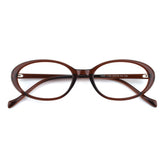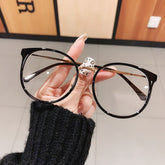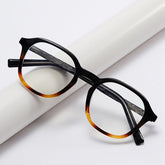What happens when you wear only anti-blue light glasses for a long time?
With the increasing popularity of anti-blue light lenses, more and more people are opting for anti-blue light lenses. But can anti-blue light glasses be your only type of glasses? The answer is no. Wearing only anti-blue light lenses for a long time harms your eyes.
Proper use of anti-blue light glasses can reduce part of the blue light and help improve the quality of our sleep, and many studies have corroborated this. For example, a medical trial at the University of Houston recruited 22 subjects aged 17-42 to participate in a survey of wearing yellow anti-blue light glasses for about 4 hours (from approximate sunset to bedtime) for 2 weeks. After analysis by saliva testing, their melatonin levels increased significantly by 58% during the night. Some subjects who had poorer sleep quality improved after the experiment period.
This shows that wearing anti-blue light glasses is very important. Although anti-blue light glasses are good, studies have shown that we cannot wear anti-blue light glasses 24 hours a day. What are the uncomfortable reactions of the body to prolonged blue light protection for the eyes?
Such use can cause a decrease in the concentration of melatonin secreted by the pineal gland. A related research paper published jointly in 2016 by the Neurology Center in Glostrup, Denmark, the Danish Sleep Medicine Center, and the Center for Clinical Neurophysiology evaluated different sleep conditions and melatonin levels after one year in people implanted with blue light-filtering IOLs and those implanted with standard IOLs (IOLs), respectively. After one year of surgery, the average 24-hour melatonin levels at the preoperative visit and 1-year follow-up for each IOL group were not different from the regular IOL. Still, the peak melatonin concentration was 50% lower for the blue-filtered IOL than it was one year earlier.
The results of this experiment were a bit surprising, as we would generally expect melatonin concentrations to be higher in blue-filtered IOLs.It means wearing anti-blue light glasses for an extended period, 24 hours a day, would probably give the same results. Melatonin is an essential hormone regulating our biological clock (circadian rhythm). A decrease in secretion means that our otherwise stable circadian rhythm becomes disturbed, making our sleep quality worse, affecting height development and immunity, which can lead to other health problems. This is when the improper use of anti-blue light glasses may turn what was originally eye protection into eye harm.
We have to use anti-blue light glasses correctly, only when using the computer cell phone wear, no longer other than the moment anti-blue light, do not wear anti-blue light glasses for a long time. Do not let yourself in a low blue light environment all day. Thus having access to natural light in the highest peak blue light, non-imaging visual cells ipRGC can perceive changes in the intensity of blue light throughout the day. Maintain sensitivity to the power of blue light and the pineal gland’s accurate judgment to secrete melatonin promptly.
So the conclusion is to wear anti-blue light glasses when you need to look at the electronic screen for a long time. And when you do not look at electronic screens, try to choose clear lens glasses.











